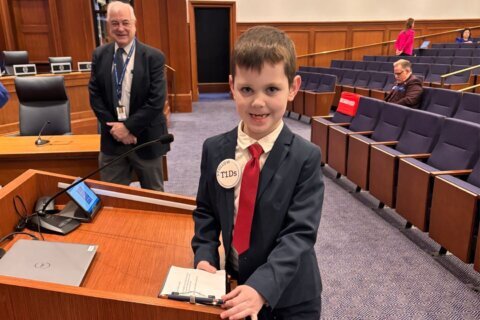Following the contested termination of a King William County, Virginia, teacher, dozens of groups, including members of Northern Virginia school boards, have come together to show their support for the decision to fire the educator who refused to say a student’s preferred pronoun.
LGBTQ advocacy organization Equality Virginia and more than 50 other partners and school board leaders in Virginia filed an amicus brief on Wednesday, asking the Supreme Court of Virginia to uphold the Circuit Court for the County of King William’s dismissal of high school French teacher Peter Vlaming’s lawsuit against the West Point School Board.
Several board members in five Virginia districts are backing the school’s decision, including Falls Church School Board members Laura Downs, David Ortiz and Lori Silverman; Arlington School Board members Barbara Kanninen and David Priddy; and Fairfax County School Board member Karl V. Frisch.
The West Point board had rejected Vlaming’s claims that his firing for violating its anti-discrimination and anti-harassment policies actually violated his own rights, under Virginia law.
“The West Point School Board has a compelling interest in protecting its transgender students from the harms associated with discriminatory treatment. It must also comply with Title IX, which prohibits discrimination against transgender children on the basis of their gender identities, and the Equal Protection Clause of the Fourteenth Amendment,” according to the brief.
“To serve these interests and comply with the law, the West Point School Board must treat its transgender students equally—including by ensuring that its staff addresses transgender students, like their cisgender peers, with the names and pronouns that reflect their gender identity.”
Vlaming, a teacher in the district for nearly six years, attempted to avoid using the student’s preferred pronouns by referring to the student by name only and was instructed by school officials to use the pronouns.
According to a news release, Vlaming stated he “couldn’t in good conscience comply with the superintendent’s order that he refer to one of his students using pronouns that were inconsistent with the student’s biological sex.”
“Peter wasn’t fired for something he said,” Chris Schandevel, senior counsel for the Alliance Defending Freedom, a law group representing Vlaming, said in a statement last May. “He was fired for something he couldn’t say.”
“In refusing to deny biological reality by acceding to his student’s demands, it was Mr. Vlaming who was acting in [the student’s] best interest,” according to court documents defending Vlaming’s actions.
The recent amicus brief, however, points to negative and harmful experiences of transgender and non-binary students in Virginia schools to illustrate why anti-discrimination policies and practices can mitigate harm; this includes using a student’s correct pronouns.
“Transgender and non-binary students, when compared to their cisgender peers, face physical abuse, bullying, and extreme emotional harm at higher rates, which impact their well-being and education,” Narissa S. Rahaman, executive director at Equality Virginia, said in a statement.
“The West Point School Board’s anti-discrimination and anti-harassment policies aim to counteract and prevent those harms,” Rahaman said. “We know that transgender students thrive when they are supported by an inclusive school environment, which includes using their correct pronouns.”
Failing to affirm the identities of transgender students is a harm well-established in the courts, according to S. Douglas Bunch, partner at the civil rights law firm that provided counsel on the brief.
“School policies, such as one of using pronouns that reflect a transgender student’s identity, are there to mitigate these harms and allow all students to thrive in school,” Bunch said.
Last June, a judge ordered Loudoun County Public Schools to reinstate physical education teacher Byron Tanner Cross, who was suspended after refusing to refer to transgender students by their preferred pronouns due to religious beliefs. His suspension was ruled unconstitutional.








